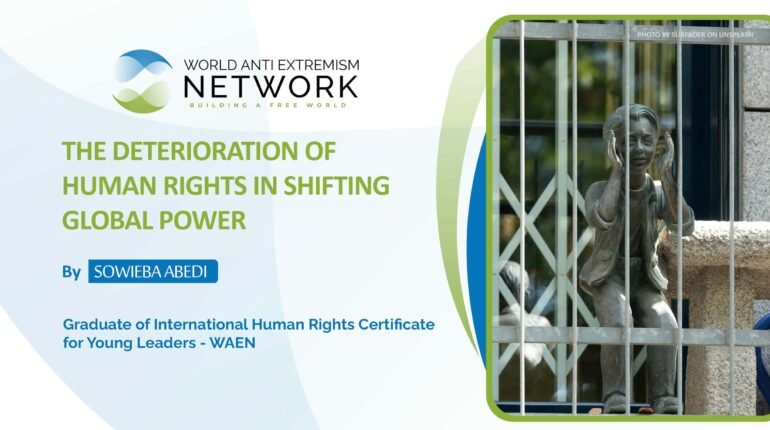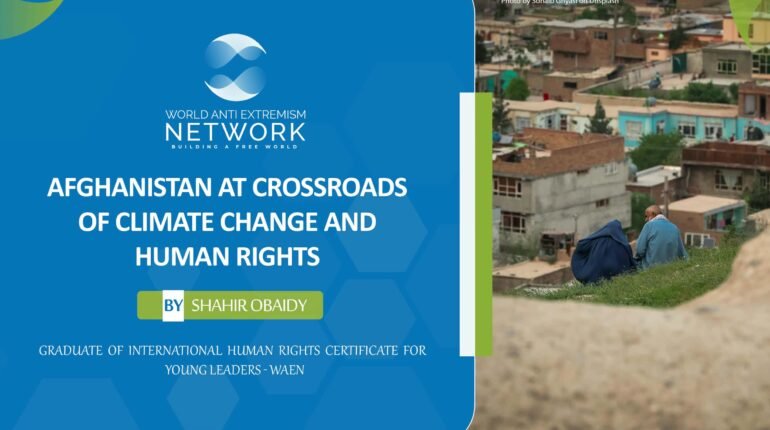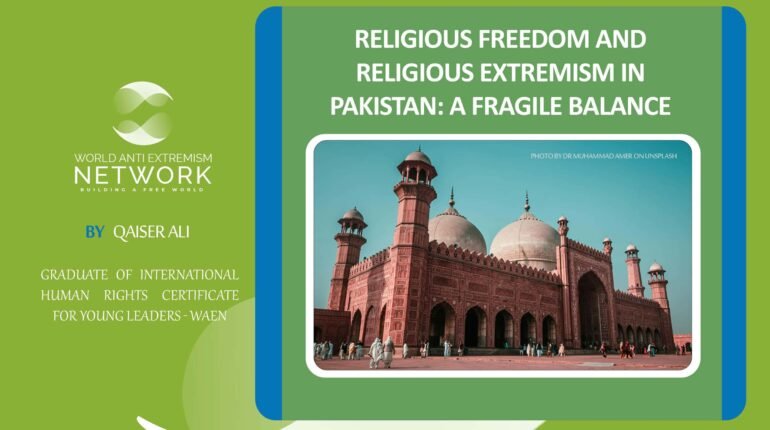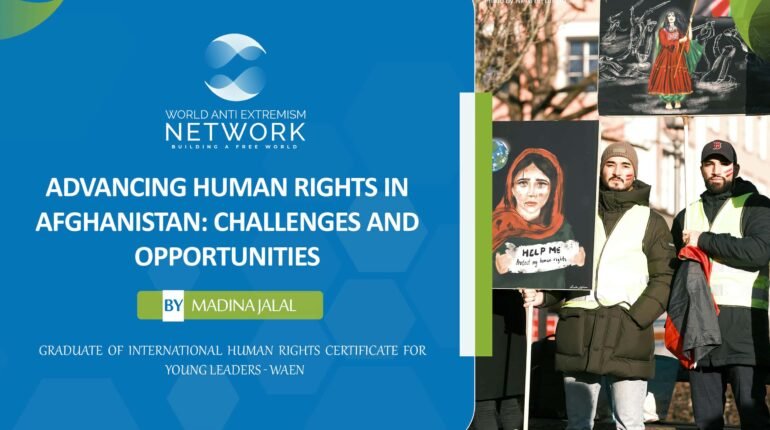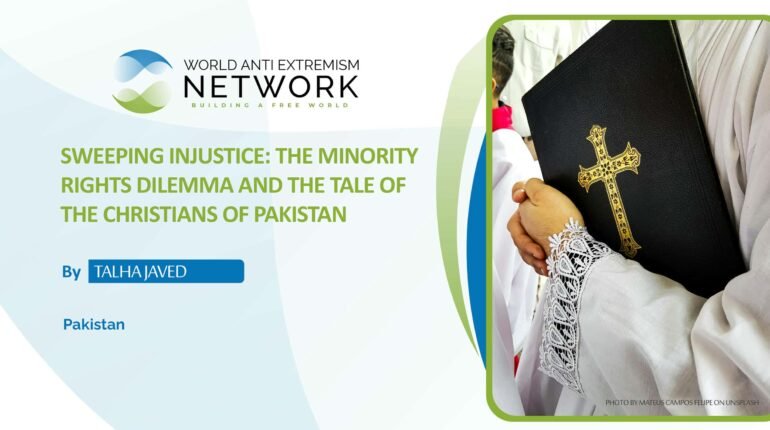Rising from Ashes: Afghan Women’s Journey to Empowerment and Peace
- World Anti Extremism Network
- Rising from Ashes: Afghan Women’s Journey to Empowerment and Peace
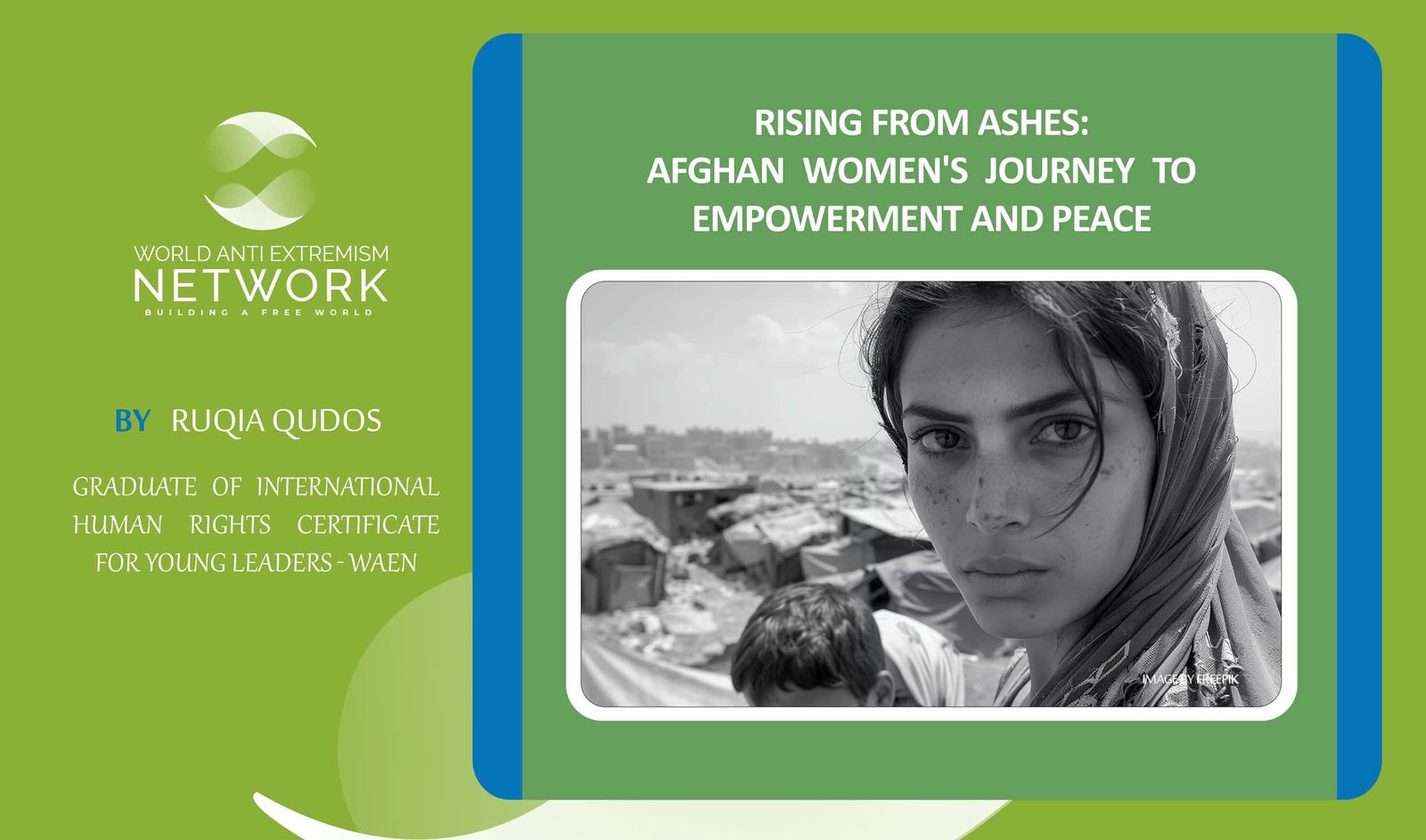
- Rising from Ashes: Afghan Women's Journey to Empowerment and Peace
- By Ruqia Qudos
- March 8, 2025
Share on:
Introduction
Afghanistan’s turbulent history has been marked by resilience and hope, particularly among its women. “Rising from Ashes: Afghan Women’s Journey to Empowerment and Peace” embarks on a profound exploration of the challenges and triumphs experienced by Afghan women under the Taliban rule. As an advocate and student from Badakhshan, Afghanistan, currently living in Islamabad, Pakistan, I aim to shed light on the multifaceted barriers to education, mobility, and autonomy faced by Afghan women and the relentless spirit that drives them toward empowerment and peace.
The Harsh Realities of Life Under Taliban Rule
The resurgence of the Taliban has thrust Afghan women into a harsh reality where their basic rights and freedoms are severely restricted. Educational opportunities have been drastically curtailed, with many girls barred from attending school and pursuing higher education. The freedom to work has also been constrained, leading to a significant decrease in female employment and economic independence. The Taliban’s strict interpretation of Sharia law imposes severe limitations on women’s mobility and participation in public life.
My personal experiences highlight the oppressive nature of these restrictions. On several occasions, I have faced barriers that illustrate the broader systemic issues affecting women. For instance, a family outing to Qargha, a popular recreational spot, was interrupted when the Taliban denied entry to women. Similarly, when my father took me to a park in Kabul, the Taliban allowed him to enter but insisted that I stay behind. When my family visited Rawza e Mazar-e-Sharif, the same exclusionary practices were enforced. These incidents are not isolated; they reflect a pervasive attitude that seeks to erase women’s presence from public life. Such restrictions are a grim reminder of the ongoing struggle for basic freedoms that many women in Afghanistan face daily.
Afghan Women’s Resilience and Empowerment
Despite these severe constraints, Afghan women continue to demonstrate extraordinary resilience. My work with Afghan women refugees in Islamabad and my efforts to facilitate online empowerment courses for Afghan girls are driven by the belief that even in the darkest times, there is a path forward. These initiatives aim to provide support and education to women who, despite the odds, strive to better their lives and contribute to their communities.
Through various platforms, I have helped my Afghan girls share their stories, gain skills, and access resources necessary for their empowerment. These efforts are not just about providing immediate relief but about fostering long-term change. By equipping women with the tools and knowledge to advocate for their rights and pursue their ambitions, we are laying the groundwork for a more inclusive and equitable society.
The stories of these courageous women reveal a profound spirit of perseverance. From defying restrictive dress codes to seeking education despite prohibitions, their determination embodies a quest for dignity and equality. Their struggles are a testament to the enduring hope and strength
of Afghan women, who continue to fight for their rights and opportunities in the face of overwhelming adversity.
Human Rights Under Siege
The Taliban’s resurgence has had a profound impact on human rights in Afghanistan, particularly for women and minority groups. The enforcement of restrictive laws and policies has led to widespread violations of basic human rights. Women’s rights to education, work, and freedom of movement have been severely curtailed, creating a climate of fear and repression.
The international community must recognize the gravity of this situation and act decisively to support human rights in Afghanistan. Advocacy and intervention are crucial to protecting those most vulnerable to the Taliban’s oppressive regime. By highlighting these human rights violations, we can mobilize global support to challenge and ultimately dismantle these repressive systems.
A Beacon of Hope
Amid these challenging circumstances, the story of Afghan women is also one of hope and potential. The global community’s support of Afghan women’s rights cannot be overstated. International solidarity is crucial for amplifying the voices of those advocating for change and ensuring that their efforts are met with tangible support. Initiatives that provide resources, raise awareness, and advocate for policy changes are essential in this fight.
As Afghan women continue to rise from the ashes of oppression, the global community must stand by them. Supporting grassroots organizations, advocating for inclusive
policies, and providing direct aid are critical steps toward creating a more equitable society. The journey towards empowerment and peace for Afghan women is ongoing, and our collective responsibility is to contribute to this cause.
Call to Action
The international community has a vital role to play in supporting Afghan women. This support can take many forms, including financial aid, advocacy, and policy interventions. By providing resources and platforms for Afghan women to share their stories and advocate for their rights, we can help build a stronger, more inclusive society.
Grassroots organizations working directly with Afghan women need sustained support. These organizations are often on the front lines, providing essential services and advocating for policy changes that can lead to lasting improvements. International partnerships and funding can help these organizations expand their reach and impact.
Conclusion
“Rising from Ashes” is more than a reflection on the struggles faced by Afghan women; it is a call to action for global solidarity and support. The resilience of Afghan women, even in the face of systemic oppression, is a powerful reminder of the strength of the human spirit. By joining forces and advocating for their rights, we can help build a future where Afghan women are empowered to achieve their full potential and contribute to a more just and peaceful Afghanistan.
In every story of struggle, there is a beacon of hope. This hope lies in the unwavering support and advocacy of individuals and organizations worldwide for Afghan women. Together, we can work towards a future where Afghan women no longer face restrictions on their freedom and where they can fully participate in shaping a prosperous and inclusive society.

Ruqia Qudos is a WPS Scholar and Research Fellow at Bytes for All, committed to women’s rights, peace, and security in conflict-affected regions. A Computer Science student at NUST, Islamabad, she integrates technology with human rights advocacy to empower women and promote security. Her work includes volunteering with AIESEC, interpreting, and engaging in global policy discussions, including a UN focus group on Afghanistan. She has also received international recognition for her essays and documentaries. Through her research and activism, Ruqia aims to bridge technology and social impact, influence policies for women’s protection, and help build resilient, peaceful communities.
The opinions expressed in these articles are solely those of the authors and do not reflect the views or positions of the organization. If you find any information incorrect, please contact (research@worldantiextremism.org), and we would be happy to assist you. You can download, distribute, and reuse this work, provided you credit the author and cite the original source.
Related Articles
Subscribe to our newsletter and stay updated.
Contact
Toronto, Ontario, M1L 0E5 Canada
Subscribe to our newsletter and stay updated.
Contact
Toronto, Ontario, M1L 0E5 Canada
Subscribe to our newsletter and stay updated.
Contact
Toronto, Ontario, M1L 0E5 Canada


